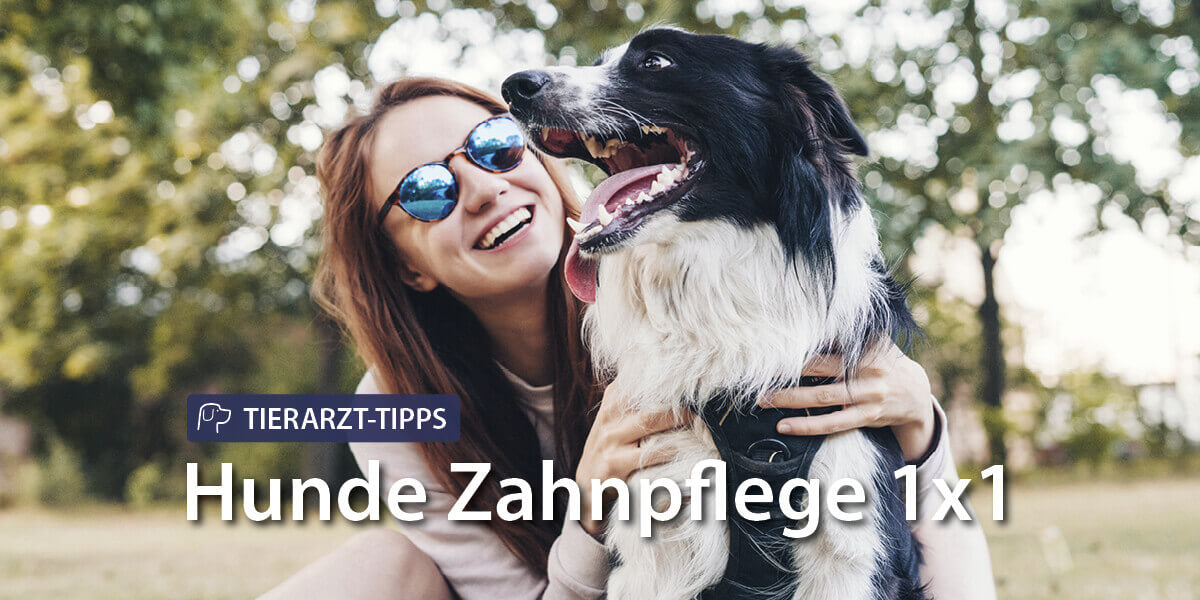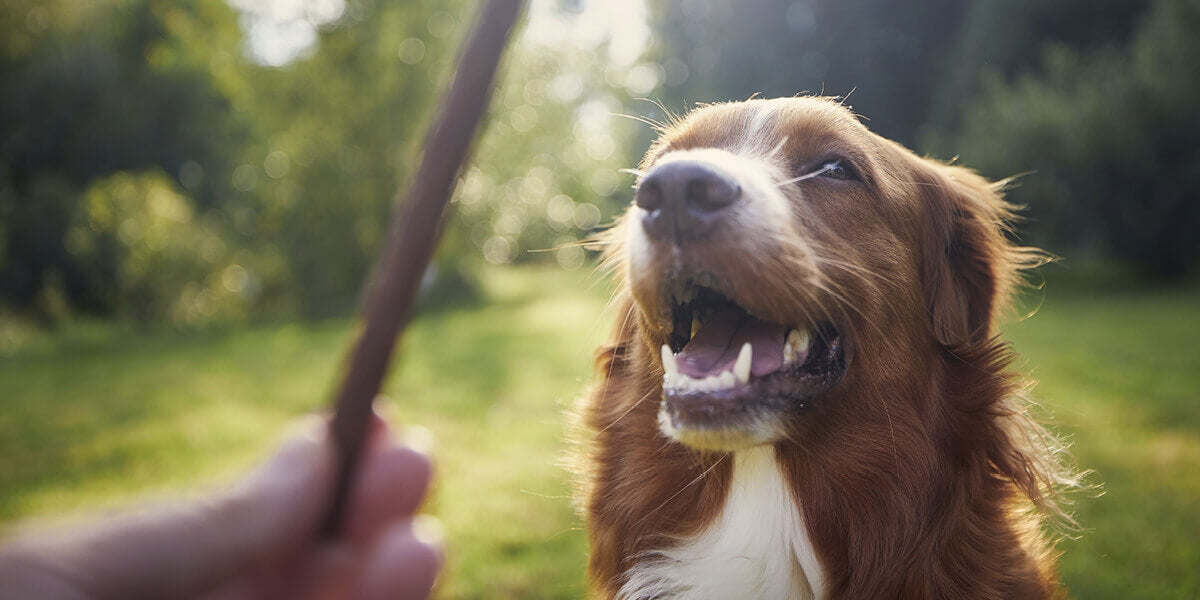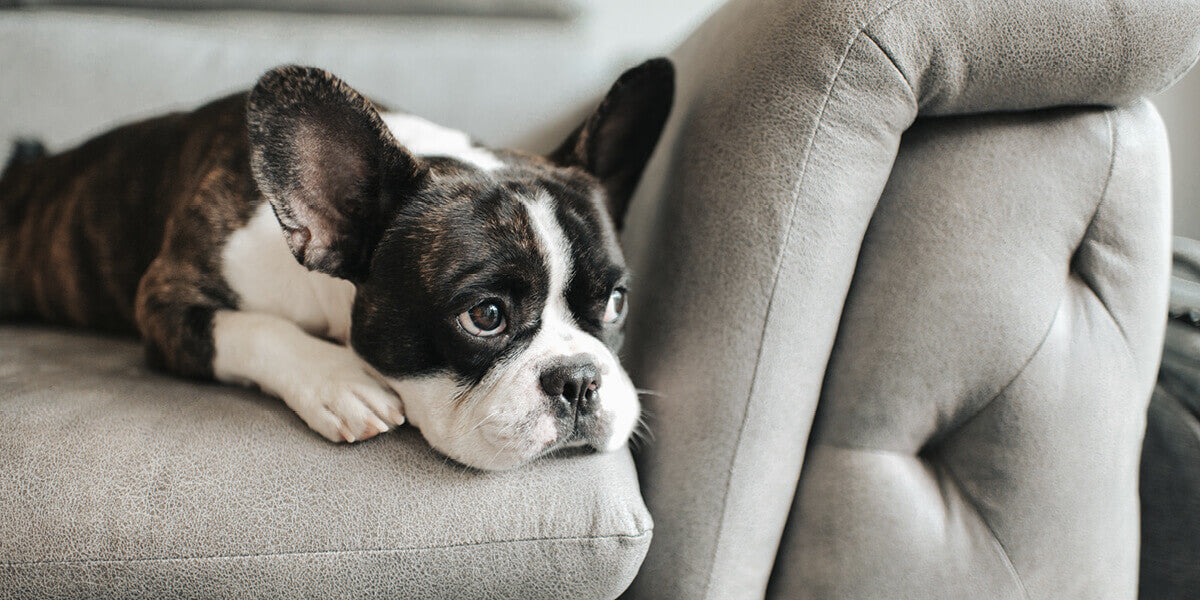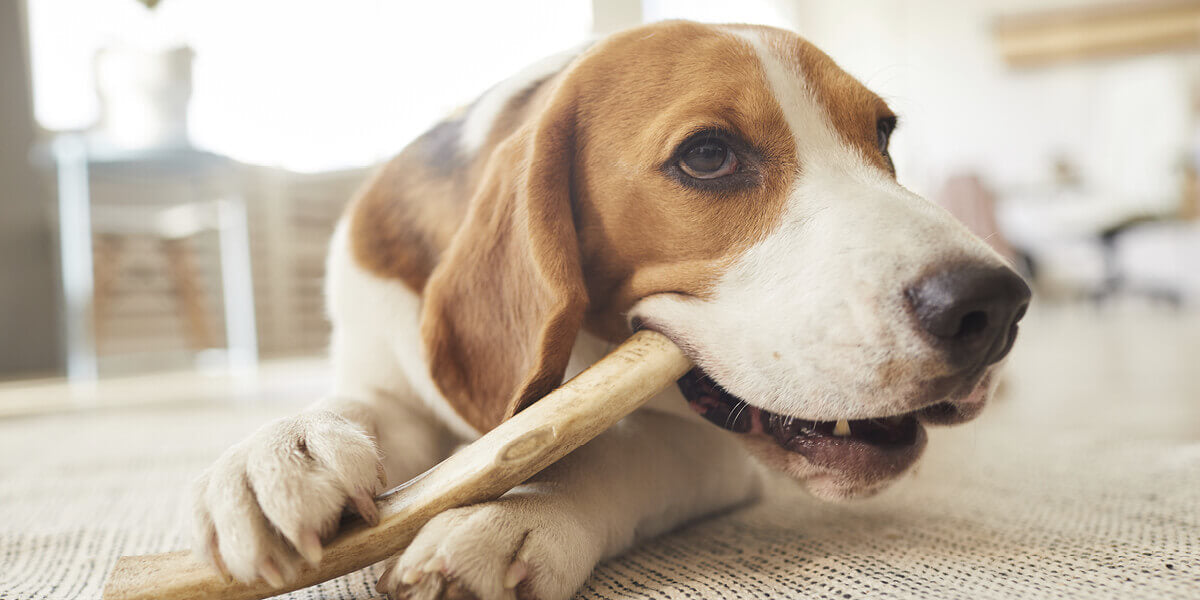
29.09.2023 - Prof. Dr. med. vet. Norbert Mencke, veterinarian
29.09.2023 - Prof. Dr. med. vet. Norbert Mencke, veterinarian
Dogs dental care 1x1 from the vet
How often do I actually have to brush my dog's teeth? Why does my dog always chew on everything? Together with our veterinarian Prof. Dr. med. vet. Mencke, we answer the most frequently asked questions from dog parents on the subject of dog dental care and recommend products that make dog dental care much easier.
Content
- Why is dog dental care important
- Different breeds of dogs and dental care
- How often must brush my dog's teeth
- What toothpaste for my dog
- Why is chewing important
- Buying tip from the vet

Why should I brush my dog's teeth?
"My dog gets raw bones regularly - that's enough. After all, wolves didn't have peppermint drops either". Many dog parents think that dog dental care with dental sticks and raw bones is enough.
Fortunately, nowadays there are many more ways to maintain mouth and dental health. According to a study, 80% of all dogs over the age of 3 have dental problems, such as tartar or gingivitis. Regular dental care will keep your dog healthy into old age, because underlying dental disease and inflammation can also negatively affect other organs in the body.

Different breeds, different needs in dog dental care
According to the FCI, there are 356 recognized dog breeds today. The different breeds are also accompanied by different needs in dog dental care. This is due to the changes in the dog's mouth, such as shortened muzzle and the changes in the teeth.
It is especially important to know here that breeds with short muzzle tend to have more dental problems due to the crowding of the jaws/teeth. But not every dog is the same. Even two dogs from the same litter can have completely different requirements for necessary dental care. A daily mouth check on your own dog is therefore the best health precaution.

How often do I have to brush my dog's teeth?
Dog dental care is all about regularity. Sporadic use of toothbrushing utensils is not enough to care for and protect your dog's teeth.
Our vet recommends making dog dental care a regular part of your daily routine. This is the most efficient way to do something for your dog's mouth and teeth health. It would be ideal to introduce dental care every day after the last feeding, for example, as an evening routine. This way it will become an integral part of your dog's daily routine.
Is there absolutely no time for it? Since plaque begins to harden into tartar after about 3 days, we recommend that dogs perform dental care at least three times a week.
Can I brush my dog's teeth with toothpaste?
You can use special toothpastes for dogs for your dog's dental care. Toothpaste for humans is not suitable due to the ingredients (e.g. fluoride, xylitol) for dogs .
Canosept offers you the Toothpaste Dental Gelwhich has been specially designed for dogs . It cleans dogs' teeth without added sugar, fluoride and xylitol and has a delicate mint flavor that dogs also like.
Dogs Dental Care - What is best for dogs teeth?
In addition to regular brushing, chewing plays an important role in canine dental care.

Why is chewing important for dental care?
Surely you know it too: Your dog has found a stick in the forest and chews on it with relish. The chewing instinct in dogs is innate and should always be satisfied.
Chewing makes happy
Bones, horns and co. not only taste delicious to the dog, but also bring many benefits. Among other things, endorphins are released when chewing. These happiness hormones stimulate the mood. So chewing makes your dog happy.
In addition, chewing helps your dog relax in stressful situations. The constant movement of the jaw muscles during biting and chewing releases tension.

Chewing supports the change of teeth
The fact that chewing is innate becomes apparent in the first months of life. Between the fourth and seventh month occurs the change of teeth in dogs. During this time, the gums can quickly become inflamed and an itchy mouth can occur.
However, the puppy knows how to help itself during this time. By chewing, the eruption of the teeth is accelerated. The change of teeth is supported.
Chewing for dogs dental care
Chewing is an essential part of the dog's dental care. It ensures that the gums are well supplied with blood. Food residues are also rubbed off during chewing. As a result, plaque in the form of tartar cannot attach so easily. In addition, the increased saliva production during chewing reduces the risk of tooth decay.
When choosing bones, our vet has a few helpful tips for healthy chewing fun.

What bones for dental care?
Bones that you want to use for dog dental care should have certain characteristics. Bones, horns and Co. for dogs should be as natural as possible and sugar-free. Also, colorants, flavorings and preservatives should not be included. Certain materials can be too hard for the dog and lead to microcracks in the tooth enamel, so we particularly advise against e.g. deer antlers.
For my dog only the best: beef bones and coffee wood
For natural chews, it is best to use beef bones or chewing roots made from coffee wood, for example. They are usually well tolerated, do not splinter and are thus the gentle chewing fun for the teeth.
Sticks, chicken and pig - let it be
It is better not to give your dog chicken and pork bones for dental care. The risk of injury from splinters is too great here. Sticks from the forest are also not recommended for dogs for this reason and are not dental care.
Dog dental care - How do I get my dog's teeth clean?
Your dog's teeth require regular care. The Canosept dental care range offers you the right dental care product for every breed, every age and every situation.
Buying tip from the vet!
With the practical Canosept dental care set and the included 3-headed toothbrush you can easily reach even the most difficult areas in the mouth and significantly reduce the cleaning time. You can find more information about the products here:
In addition to regular dental care with the toothbrush, the Canosept dental care spray and dental care finger pads are a great support against bad breath in dogs - for quick dental care in between and instant fresh breath in dogs.

About the author:
Professor Dr. med. vet. Norbert Mencke has been working as a veterinary scientific advisor for Ardap Care GmbH since 2020. As a veterinarian and dog owner for many years, he knows the problems and questions that dog parents have from a professional and personal perspective. As an expert on the subject of dog health, Norbert Mencke provides you with helpful information and tips. You can reach Norbert Mencke at mencke@ardapcare.com.
Prof. Dr. med. vet. Norbert Mencke, Veterinarian

About the author:
Professor Dr. med. vet. Norbert Mencke has been working as a veterinary scientific advisor for Ardap Care GmbH since 2020. As a veterinarian and dog owner for many years, he knows the problems and questions that dog parents have from a professional and personal perspective. As an expert on the subject of dog health, Norbert Mencke provides you with helpful information and tips. You can reach Norbert Mencke at mencke@ardapcare.com.
Prof. Dr. med. vet. Norbert Mencke, Veterinarian
Popular blog articles on the topic

4 tips for easy brushing teeth for dogs
How do I get my dog used to brushing his teeth without stress and resistance? In this blog article, we've summarized the most important steps for a relaxed tooth brushing routine and introduce products that can make brushing easier. Learn more now.

Bad breath dog - what you can do
Help! My dog stinks from the mouth - what can I do about bad breath in dogs? We have summarized the most important answers from our vet and first aid tips against unpleasant mouth odor in dogs in this blog article.

4 Buying tips: find the ideal dog toothbrush
Still undecided which dog toothbrush is best for your dog? With these 4 tips for the perfect dog toothbrush, you'll save time, money & nerves when buying and later when caring for your dog's teeth. Read on now.
